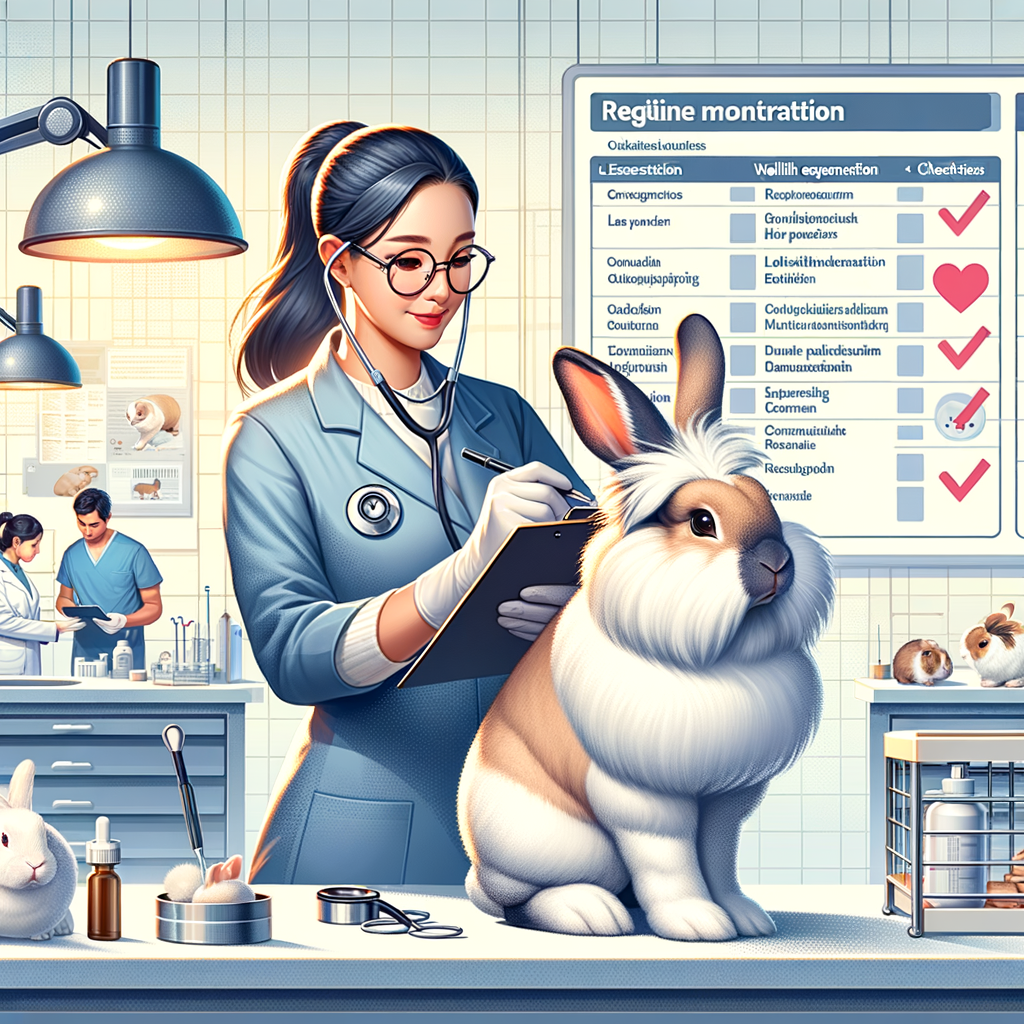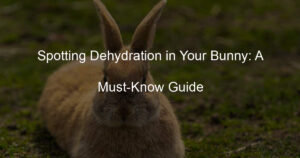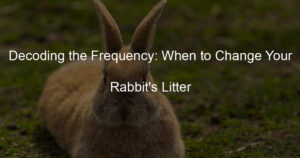
Introduction to Lionhead Rabbit Health
Welcome to our comprehensive guide on Lionhead Rabbit health. This post aims to provide you with essential information about the importance of regular health checks and common health issues in Lionhead Rabbits.
- Understanding the importance of regular health checks
- Common health issues in Lionhead Rabbits
Regular health checks are crucial for your Lionhead Rabbit’s wellbeing. Just like humans, rabbits can also suffer from various health issues. Regular check-ups allow you to detect any potential problems early, which can significantly improve the chances of successful treatment. Health checks also provide an opportunity to monitor your rabbit’s weight and diet, ensuring they’re getting the right nutrients for a healthy life.
Lionhead Rabbits, like other rabbit breeds, are prone to certain health issues. Some of the most common include dental diseases, digestive problems, and respiratory infections. Dental diseases can be particularly problematic as rabbits’ teeth continue to grow throughout their lives. If not properly managed, this can lead to painful conditions and difficulty eating. Digestive problems can be caused by a poor diet or stress, while respiratory infections are often due to poor living conditions or exposure to other sick animals.
By understanding these common health issues and the importance of regular health checks, you can ensure your Lionhead Rabbit leads a happy and healthy life. Stay tuned for more detailed information on each of these topics in the following sections of this guide.
Checking Rabbit Health: The Basics
Keeping your rabbit healthy is crucial for their overall well-being. Regular physical examinations can help you detect any potential health issues early. Let’s delve into the basics of checking your rabbit’s health.
Physical Examination
A physical examination is an essential part of maintaining your rabbit’s health. This involves checking the rabbit’s body condition and examining their eyes, ears, and teeth. Here’s how to do it:
- Checking the rabbit’s body condition
- Examining the rabbit’s eyes, ears, and teeth
Start by examining your rabbit’s body condition. A healthy rabbit should have a sleek and shiny coat, with no bald patches or signs of parasites. Their body should feel firm but not too thin or overweight. You can check this by gently running your hands over their body, feeling for any unusual lumps or bumps. Always remember to handle your rabbit with care to avoid causing them any stress or discomfort.
The eyes of a healthy rabbit should be bright and clear, with no signs of redness, swelling, or discharge. Their ears should be clean and free from any signs of infection, such as redness, swelling, or a foul smell. Lastly, check their teeth. Rabbits’ teeth grow continuously throughout their life, so it’s important to ensure they are not overgrown or misaligned, which could lead to eating difficulties. If you notice any abnormalities, it’s best to consult with a vet immediately.
Regular physical examinations are a key part of keeping your rabbit healthy. By being proactive and checking your rabbit’s health regularly, you can help prevent potential health issues and ensure your rabbit lives a long, happy life.
Behavioral Checks
Understanding your Lionhead rabbit’s behavior is crucial in ensuring their health and well-being. Let’s delve into two key aspects of behavioral checks: monitoring eating habits and observing changes in behavior.
- Monitoring Eating Habits
- Observing Changes in Behavior
Rabbits are herbivores and have a unique digestive system. They need to eat regularly to keep their gut moving and prevent health issues. Monitoring your rabbit’s eating habits is a simple yet effective way to keep track of their health.
Typically, a healthy rabbit will consume a diet consisting of hay, fresh vegetables, and a small amount of pellets. If you notice any changes in your rabbit’s eating habits, such as eating less or refusing food, it could be a sign of a health problem. For instance, a decrease in appetite could indicate dental issues, as eating may cause discomfort.
Rabbits are creatures of habit. They usually have a consistent routine and behavior pattern. Any sudden changes in behavior can be a sign that something is not right.
For example, if your usually active rabbit becomes lethargic or your normally sociable rabbit starts to avoid interaction, it could be a sign of illness. Changes in behavior can also be subtle, such as changes in grooming habits or litter box usage. It’s important to know your rabbit’s normal behavior so you can quickly spot any changes.
In conclusion, keeping a close eye on your rabbit’s eating habits and behavior can help you detect any potential health issues early. Remember, when in doubt, always consult with a vet.
Regular Monitoring of Rabbits: A Detailed Guide
Keeping a close eye on your rabbit’s health is crucial. Regular checks can help identify any potential issues early, allowing for prompt treatment. This guide will walk you through the weekly checks you should be performing on your rabbit.
Weekly Checks
Weekly checks are a fundamental part of rabbit care. These checks should focus on the rabbit’s fur and skin, as well as monitoring any weight changes. Let’s delve into these in more detail.
- Checking the rabbit’s fur and skin
- Monitoring weight changes
Healthy rabbits have clean, smooth fur and skin. When checking your rabbit’s fur, look for any signs of bald patches, dandruff, or parasites. The skin should be free of redness, swelling, or wounds. If you notice any abnormalities, it may indicate a health problem and you should consult your vet.
Weight changes in rabbits can be a sign of health issues. A sudden weight loss could indicate a serious problem such as dental disease or a digestive disorder. On the other hand, weight gain can lead to obesity, which can cause a range of health problems. Regularly weighing your rabbit can help you spot these issues early. A healthy weight for a rabbit varies depending on the breed, but generally, they should weigh between 2 to 5 pounds.
Remember, regular monitoring is key to ensuring your rabbit’s health. By performing these weekly checks, you can help keep your rabbit healthy and happy.
Monthly Checks
As part of your monthly routine, there are two key health checks that you should perform on your Lionhead rabbit. These checks are crucial in maintaining your rabbit’s health and ensuring they live a happy and comfortable life.
-
Inspecting the rabbit’s teeth
Rabbits have a unique dental structure. Their teeth never stop growing! This is why it’s important to regularly inspect your rabbit’s teeth. Overgrown teeth can cause discomfort and may even prevent your rabbit from eating properly.
To inspect your rabbit’s teeth, gently lift their lips and take a look at the front teeth. They should be even and not overly long. If you notice any changes or abnormalities, it’s time to visit the vet.
Remember, providing your rabbit with plenty of hay and chew toys can help naturally wear down their teeth and prevent overgrowth.
-
Checking for parasites
Parasites, such as fleas, mites, and worms, can cause a lot of discomfort for your rabbit and may lead to serious health problems if left untreated. Regularly checking your rabbit for parasites is a key part of their monthly health check.
To do this, carefully examine your rabbit’s fur and skin for any signs of parasites. This includes looking for small moving specks, redness, itching, or unusual fur loss. If you spot any of these signs, it’s important to seek veterinary advice immediately.
Keeping your rabbit’s living environment clean and providing them with a balanced diet can help prevent parasites.
Performing these monthly checks can help you spot any potential health issues early on and ensure your Lionhead rabbit stays healthy and happy. Remember, if you’re ever unsure about something, it’s always best to consult with a vet.
Wellness Checks for Rabbits: When to Visit the Vet
Just like humans, rabbits need regular check-ups to ensure they are in good health. These wellness checks are crucial in catching any potential health issues early on. In this section, we will discuss the importance of regular veterinary checks and how to recognize signs of illness that require immediate veterinary attention.
- Understanding the importance of regular veterinary checks
Regular veterinary checks are essential for maintaining your rabbit’s health. These checks allow the vet to monitor your rabbit’s weight, teeth, and overall health. Regular check-ups can help detect potential health problems early, which can lead to more effective treatment and a better prognosis. According to a study by the House Rabbit Society, rabbits that receive regular veterinary care live longer and healthier lives.
During these check-ups, the vet will typically examine your rabbit’s teeth, ears, eyes, and fur for any signs of disease. They may also listen to your rabbit’s heart and lungs, and check their weight. Regular veterinary checks are a key part of preventative care, helping to ensure your rabbit stays healthy and happy.
- Recognizing signs of illness that require immediate veterinary attention
Rabbits are prey animals, which means they are very good at hiding signs of illness. However, there are some signs that you can look out for that may indicate your rabbit needs immediate veterinary attention. These include:
| Signs of Illness | Description |
|---|---|
| Change in eating or drinking habits | If your rabbit is eating or drinking less than usual, or not at all, this could be a sign of a serious health problem. |
| Lethargy | If your rabbit is less active than usual or seems weak, they may be unwell. |
| Change in behavior | Any sudden changes in your rabbit’s behavior, such as aggression or fearfulness, could be a sign of illness. |
| Difficulty breathing | If your rabbit is breathing heavily, rapidly, or with difficulty, they need immediate veterinary attention. |
If you notice any of these signs, it’s important to take your rabbit to the vet as soon as possible. Early detection and treatment can significantly improve your rabbit’s chances of recovery.
Rabbit Health Tips: Maintaining a Healthy Environment
Keeping your rabbit healthy involves more than just regular vet visits. The environment in which your rabbit lives plays a crucial role in its overall health and wellbeing. Here are some tips to ensure you’re providing the best environment for your rabbit.
- Providing a Clean and Safe Living Space
- Ensuring a Balanced Diet
Rabbits are clean animals and require a clean living space to stay healthy. This means regularly cleaning their cage, removing any waste, and washing their bedding. A clean environment reduces the risk of diseases and infections. Also, ensure that their living space is safe. This means no sharp objects that they could hurt themselves on, and no small items they could accidentally swallow. A safe and clean environment is the first step towards a healthy rabbit.
Rabbits need a balanced diet to stay healthy. This includes a mix of hay, fresh vegetables, and rabbit pellets. Hay should make up the majority of their diet as it helps with digestion and dental health. Fresh vegetables provide essential vitamins and minerals, while rabbit pellets are a good source of fiber. Avoid feeding your rabbit too many treats as this can lead to obesity and other health problems. Remember, a balanced diet is key to a healthy rabbit.
By maintaining a clean and safe environment and ensuring a balanced diet, you’re setting your rabbit up for a long, healthy life. Remember, your rabbit depends on you for its health and wellbeing, so it’s important to take these responsibilities seriously.
| Key Elements for Rabbit Health |
|---|
| Clean and Safe Living Space |
| Balanced Diet |
Lionhead Rabbit Care: Exercise and Socialization
When it comes to Lionhead Rabbit care, two crucial aspects are often overlooked: exercise and socialization. These two elements play a significant role in the overall health and happiness of your Lionhead Rabbit.
- Importance of regular exercise for Lionhead Rabbits
- Understanding the social needs of Lionhead Rabbits
Exercise is vital for Lionhead Rabbits. Just like humans, rabbits need to move their bodies to stay healthy. Regular exercise helps to maintain a healthy weight, promotes good digestion, and keeps their muscles strong and flexible.
Without regular exercise, Lionhead Rabbits can become overweight, which can lead to a host of health problems such as heart disease and arthritis. Exercise also helps to prevent boredom and provides an outlet for their natural behaviors such as running, jumping, and exploring.
Providing your Lionhead Rabbit with a safe and stimulating environment to exercise in is key. This can include a large, secure enclosure with plenty of room to run and jump, as well as toys and obstacles to interact with.
Lionhead Rabbits are social creatures by nature. They thrive on interaction with their own kind and with their human caregivers. A lonely rabbit can become depressed, which can lead to a decline in their physical health.
It’s important to spend quality time with your Lionhead Rabbit every day. This can include playtime, grooming, or just sitting together. If you have more than one rabbit, they should be housed together so they can keep each other company. However, ensure they are of the same sex or neutered to prevent unwanted litters.
Understanding and meeting the social needs of your Lionhead Rabbit will not only contribute to their overall health but also strengthen the bond between you and your furry friend.
In conclusion, regular exercise and socialization are vital for the health and happiness of your Lionhead Rabbit. By providing a safe and stimulating environment for exercise and spending quality time with your rabbit, you can ensure they live a long, happy, and healthy life.
Common Lionhead Rabbit Health Issues
Just like any other pet, Lionhead Rabbits can also suffer from various health issues. Understanding these common diseases and conditions can help you take better care of your furry friend. Let’s dive into some of the most common health problems that Lionhead Rabbits face.
- Understanding common diseases and conditions
Lionhead Rabbits are prone to several health problems. Here are some of the most common ones:
- Dental Disease: This is a common issue in many rabbits. Their teeth continuously grow, and if they don’t get enough roughage to grind them down, they can develop painful dental problems.
- Gastrointestinal Stasis: This condition occurs when a rabbit’s digestive system slows down or stops completely. It can be caused by stress, dehydration, or a diet low in fiber.
- Respiratory Infections: These can be caused by bacteria, viruses, or fungi. Symptoms include sneezing, runny nose, and difficulty breathing.
- Ear Mites: These tiny parasites can cause itching and discomfort. If left untreated, they can lead to serious infections.
- Prevention and treatment options
Prevention is always better than cure, especially when it comes to your pet’s health. Here are some ways to prevent these common health issues:
- Dental Disease: Provide your rabbit with plenty of hay and chew toys to help grind down their teeth and prevent dental disease.
- Gastrointestinal Stasis: Ensure your rabbit has access to plenty of fresh water and a diet high in fiber to keep their digestive system running smoothly.
- Respiratory Infections: Keep your rabbit’s living area clean and dry to prevent the growth of bacteria, viruses, and fungi.
- Ear Mites: Regularly check your rabbit’s ears for signs of mites and consult a vet if you notice any changes.
When it comes to treatment, it’s important to consult a vet as soon as you notice any signs of illness in your rabbit. They can provide appropriate medication and care instructions to help your pet recover quickly.
Conclusion: Maintaining Rabbit Health
As we wrap up our comprehensive guide on Lionhead Rabbit health, let’s recap the crucial points and share some final tips to ensure your furry friend stays in the best possible health.
- Recap of the importance of regular checks and a healthy environment:
- Final tips for keeping your Lionhead Rabbit healthy:
Regular health checks are vital for your Lionhead Rabbit’s wellbeing. This includes monitoring their behavior, weight, and physical condition. Changes in any of these areas could indicate a potential health issue that needs immediate attention. A healthy environment is equally important. Ensure your rabbit’s living space is clean, spacious, and stimulating to promote physical activity and mental well-being.
Firstly, establish a routine for your rabbit that includes a balanced diet, regular exercise, and social interaction. Secondly, always be observant. If you notice any changes in your rabbit’s behavior or appearance, don’t hesitate to consult with a vet. Lastly, remember that your rabbit’s emotional health is as important as their physical health. Provide them with plenty of love, attention, and care.
In conclusion, maintaining your Lionhead Rabbit’s health requires a combination of regular health checks, a healthy environment, and a lot of love and care. With these tips in mind, you can ensure your rabbit lives a long, happy, and healthy life.




